#post read essay
Explore tagged Tumblr posts
Text
A continuation of my assessment of Discworld books.
I have read Feet of Clay.
Heck.
Not exactly sure what more I can say.
Well. I'll try to get more in depth.
I haven't heard many good things about this one (mostly neutral opinions), which is a shame. If you've read the watch books in order, G!G! is a great start for Discworld overall and Men at Arms is a stellar follow up. But Feet of Clay makes everything make sense. It shows us why and how Vimes exists (because Vetinari sculpted him and put words in his head), what the watch is really capable of, and it is a better analogue to our real world than any prior book.
Feet of clay is about 3 different kings. The king made by kings who knows better than to rule, which is Carrot. The King made by lords and wealthy men who doesn't want to rule because he knows it's a figurehead position, which is Nobby. And the king made by the oppressed that could not be a good king despite trying, which is Meshugah. It is interesting that all three of the first watch novels have this obsession with kingship. In G!G! The villain wants to be king because he wants power and wealth and money and so on. In Men at Arms, the inciting incident is that someone realizes there is a "proper" king to be had and it would only be right and proper by the lord's and ladies of the city to have him installed. But in Feet of Clay everyone seems to want a king; not for power per se, but because they envision a king as a savior in a time of crisis. But they don't realize what Vetinari and Carrot know as of the end of Men at Arms, that kings fail and the throne is rotted hollow behind the gold leaf. And this is the point of the novel, I think. To have feet of clay means to be mighty and powerful but simultaneously weak or to have a particular weak point. It seems that kingship in and of itself is a weakness. No good king could be a good king because no good king represents a cohesive community, no great kingdom can be ruled by one man because it is inherently fragmented. And a good king in a position where he cannot be a good king is driven to madness. It happens to Nobby when he jumps out of the window and wholesale rejects the offer of kingship. It happens to Meshugah right when he's made, because he comes into being with the role of king and no way to fulfill his role. And Angua fears that it is happening to Carrot, that he is so close to snapping but unable to let himself snap.
Personally, my favorite part of Feet of Clay is Dorfl. Dorfl is the ideal person in the book, almost as much the hero/protagonist as Vimes and as much of a self realization story as Cheri. Because Dorfl starts out wanting a king, believing he must have a master and that there must be a savior for his kind. Dorfl is one of the golems that makes a king. And it is literally Dorfl's feet that become the feet of clay upon which the golem king Meshugah stands. When Dorfl realizes that he can be his own master, that he can own himself and his actions and his body, he realizes that the king he made is more his responsibility than he is its responsibility. And so he goes about trying to dismantle the king he made, because of all the people that make a king in this book Dorfl is actually capable of assuming responsibility for the king he helped create.
It also doesn't hurt that Dorfl is just a cool character. He gets to catch a javelin fired from the Piecemaker at near point blank range, he gets a fantastic fight scene, and he does something that I think no other golem ever does in Discworld which is he lives by his own words.
There is more to love about the book, of course, like the scathing take on capitalism and property (though I don't think that is as pertinent now as when it was written), and the whole matter of Cheri (who I also love and will perhaps write more about later) and her manifesting her self.
Anyway. It is worth reading the watch books to get to Feet of Clay. And I imagine Feet of Clay is worth reading for the rest as well.
37 notes
·
View notes
Text
I am so utterly fascinated by “Saki”, the 18-year-running mahjong manga in which you, the reader, become gradually, frog-boilingly aware (over the course of nearly two decades’ worth of mahjong tournaments) that none of these girls are wearing underwear and most of their boobs are slowly expanding.
I need you to understand that I have, like, an anthropological level fascination with this comic. From the perspective of someone who is also a comic artist and writer, two things delight me about it:
the fact that I understand completely how an artist gets from “the fans can have a little hint of skirted asscheek” to “the pussy is completely out on center page” over the course of 18 years; and
the way in which the pussy being out is treated by the characters and diegesis as being utterly unremarkable.
Okay. Point 1. The frog-boiling.
Let me put this in perspective for you. There was already a meme about how the characters in “Saki” don’t wear underwear when I was in middle school. I am thirty now. Okay? And it’s still going.
In the time since, this has stopped being a joke. It is now indisputable canon. This is not because anyone outright says it at any point. It’s because the underwear ran out of places to hide. I’m obsessed with this thought: somewhere in the over 20 volumes of “Saki”, there is a panel in which underwear was objectively deconfirmed. And it would be so hard to figure out where that panel actually is. Maybe the artist didn’t even realize it when she drew it! The frog? Boiling!!
And of course there is also the breast expansion. I don’t know how to put a spin on this. They are just expanding. Like, this happens a lot with artists: you define a character as being, in your mind, “the one with the big boobs”, and over the years you emphasize that trait further and further so that the signal doesn’t get lost in the noise. It’s just that normally—in like a wildly popular manga series about mahjong published by literally Square Enix, for example—normally there would be a point at which the boobs stopped getting bigger. Like, an editor would step in or something. Or you would get to the point where you cannot draw the character in the same panel as her mahjong tiles without her breasts spilling over the tiles, and you’d go, “Well, this is now untenable.”
That did not happen. There is no ceiling. The frog is soup.
Point 2. The complete and utter mundanity of all of this.
It’s like this, okay: there’s no shortage of trashy ecchi manga out there. There’s a million other comics doing wildly bawdier things with wildly more improbable bishoujos.
The vibe with “Saki” is different.
It’s hard to explain this, but it feels like the world of the comic is fundamentally uninterested in the fanservice happening on the page. I cannot describe it as “leering”, because I cannot conceive of a person in the story from whose point of view one would leer. I think the artist is probably into it—I can’t imagine anyone is making her do this—but “Saki” the comic has no opinion on the matter.
There are essentially no male characters in “Saki”. Like, there was one guy? Kind of? At the very beginning? But he is gone now. They put him back in the toybox. He does not exist. It appears to be some level of canonical that in the world of “Saki”, almost all humans are women. Those women are sometimes romantically into each other. According to comments the artist has made on Twitter (which I cannot source), they have lesbian baby technology, so it’s no problem. It’s so much not a problem that the story is about mahjong, instead of any of that.
So, like, the fiction here appears to be this: this is the, like, meta-narrative of the fanservice of “Saki”, right: it’s just normal that they don’t wear underwear and their boobs are arbitrarily big. It’s been normal. It was normal before the story of the manga began. It’s just how things are. Nobody bats an eye about it, and if they do, it’s in sort of a lesbian kind of way so like what’s the problem, we love lesbians here. This is literally normal for girls.
The fanservice simply diffuses into this all-encompassing aura of disembodied, ambient sluttiness. The framing of the panels demands you acknowledge it, and the story demands you already be over it, because it’s mahjong time now, and we’re playing mahjong.
Do you get??? why I’m so fascinated??? Are you not a little enraptured???
Anyway, I have no idea how to end this weird post. I guess the conclusion is that women stay winning????
41K notes
·
View notes
Text
"A story doesn't need a theme in order to be good" I'm only saying this once but a theme isn't some secret coded message an author weaves into a piece so that your English teacher can talk about Death or Family. A theme is a summary of an idea in the work. If the story is "Susan went grocery shopping and saw a weird bird" then it might have themes like 'birds don't belong in grocery stores' or 'nature is interesting and worth paying attention to' or 'small things can be worth hearing about.' Those could be the themes of the work. It doesn't matter if the author intended them or not, because reading is collaborative and the text gets its meaning from the reader (this is what "death of the author" means).
Every work has themes in it, and not just the ones your teachers made you read in high school. Stories that are bad or clearly not intended to have deep messages still have themes. It is inherent in being a story. All stories have themes, even if those themes are shallow, because stories are sentences connected together for the purpose of expressing ideas, and ideas are all that themes are.
#original post#text post#500#1k#2k#btw i know my definition of death of the author is loosey goosey here#it wasn't the main point so i went informal with it! as ppl in the tags have pointed out it isn't exact#and i do recommend reading the wikipedia article or similar (possibly even the essay itself if you're narsty) if you want to learn more!#wasn't expecting this to take off so my apologies to my barthes-heads out there#love you mwah#5k#10k#15k#20k
30K notes
·
View notes
Text
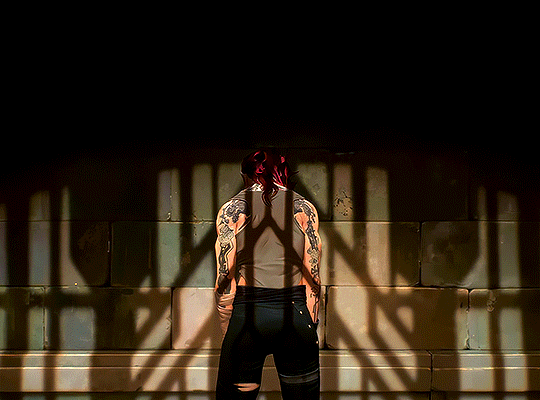
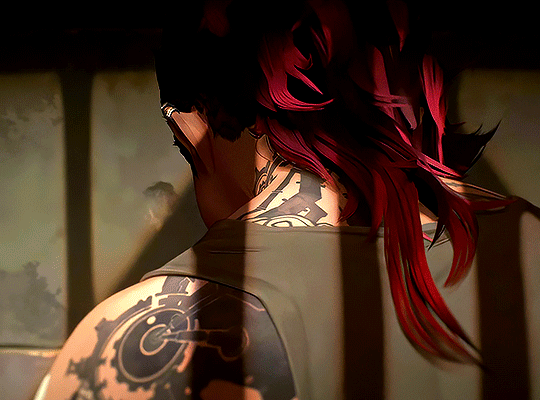
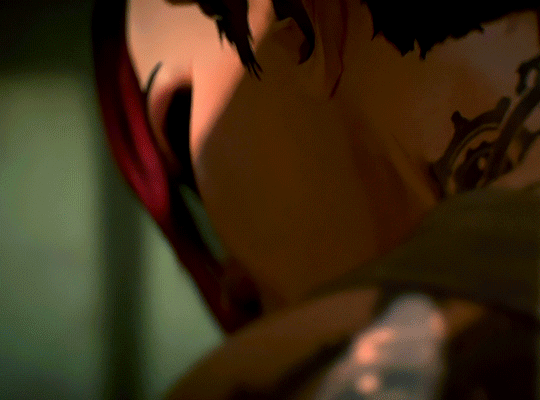

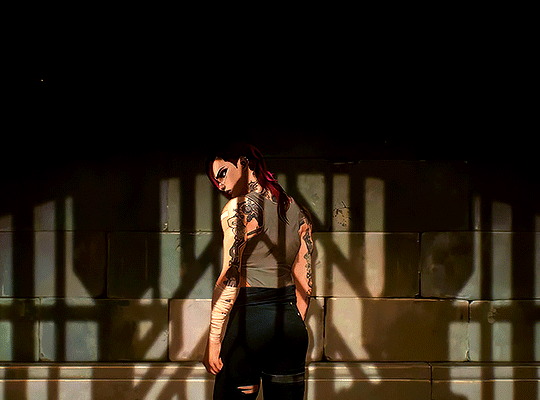

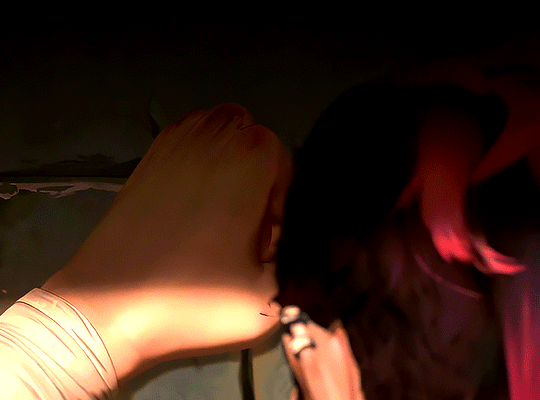
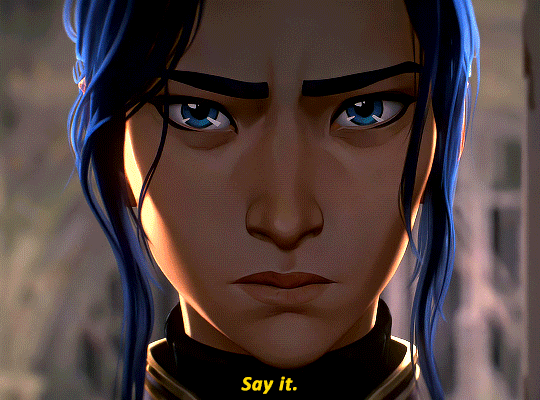
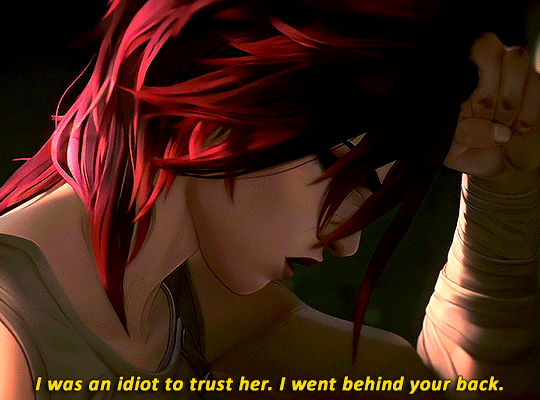


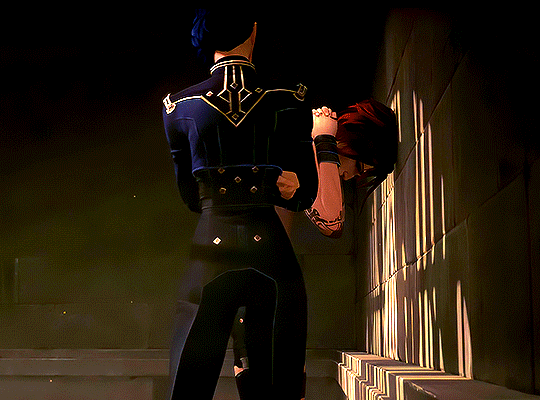



ARCANE LEAGUE OF LEGENDS: 2x08 - “Killing is a Cycle” ↳ "Some people are really misunderstanding the dialogue before the scene in the cell" | (essay link)
#please read the essay it made me appreciate it more when i read it#also sorry not much gifs today sadly im too busy for the next few days but i will post at least two sets a day#arcane#arcaneedit#wlwedit#caitvi#piltover's finest#arcane league of legends#league of legends arcane#vi#vi arcane#caitlyn kiramman#caitlyn arcane#arcane caitlyn#league of legends#type: gif#media: arcane#s2 ep9#gonna try to make some 8k wallpapers tomorrow#god coloring this was so painful enjoy
5K notes
·
View notes
Text
here's a link to the free pfd of Ur-Fascism by Umberto Eco. It's a 10 pages long essay in which the author talks about his own experience with fascism and then tries to list the 14 elements that make up fascism in all its historical forms.
#i have mentioned this essay several times in the past but i feel like this is an era in which everyone should read this#again it's super short and very very approachable#do yourself a favour and read it#i have last read it a few years ago and i plan on doing a reread very soon#so you'll see me mention in again in other posts#i have been wanting to make this post for over a week now and finally here it is#cris speaks#historyblr#studyblr#studyinspo#current events#urfascism#umberto eco#essay#to read#tbr#bookblr#booklr#non fiction essay#politics
1K notes
·
View notes
Text
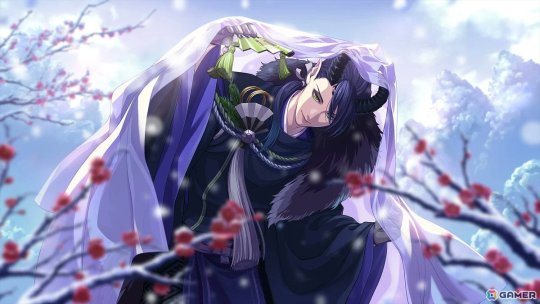
I really appreciate the beauty of Malleus New Year's card. But most importantly, other than its gorgeousness, I also appreciate how it pays so much homage to his status and character, from the flowers, the clothes, and the setting. 🥹
We know that wisterias were prevalent in his Dorm Groovy SSR, this time its another flower which is the red plum blossom here😭❤️
In Chinese philosophy, the Plum tree’s blossom is a symbol of winter ending and a herald of spring. The tree’s pale pink blossoms are cherished because they bloom vibrantly and so bravely amidst the winter chill. They symbolise perseverance and hope, as well as, beauty thriving in adverse circumstances.
The way this flower's meaning is so matched with Malleus' character is so precious. We know he's "the herald of spring" because his birth brought forth a hope that the Draconias(or the faes in general) won't die out just yet (the ending of winter) and the fact that this flower blooms even in winter probably symbolizes the fact that when he was an egg, he was still perservering to live. This also applies to his life as he grows up. With the way even if his life is riddled with loneliness and exclusion, he makes an effort to go out and adjust himself with others, he doesn't give up even if his reality consistently places him in situation where his goals can never be achieved (that is, him being accepted socially and him being ignorant of human culture but still makes an effort to understand it), he just continues to be hopeful that someone/ some place will invite him, therefore his ability to thrive in adverse circumstances.
The way he slowly rises in this card makes me feel like it symbolizes how slow paced Malleus is "in going out/getting used to outside of his comfort zone", actually lol. He described his admission to NRC as him being nervous because its an unknown place but still hopeful for the experiences that he might get(acccording to the vignette of his GloMas SSR), just like him here rising from the snow and the way he lifts the veil which makes me think he wants to see the world outside of his country's point of view with his own eyes.
Japanese tradition holds that the Plum (or ‘ume’) is celebrated as a protective charm against evil, so the ume is traditionally planted in the northeast of the garden, the direction from which evil is believed to come.
I also read this symbolism which makes me tear up lmaooo 😭Because we know in Book 7, Briarland was invaded from northeast where the Silver Owls originated from 💀 The fact that the plum blossom is a protection flower and he's surrounded with it in this card makes me think that it symbolizes how protected he was during Briarland's era 😭and another thing to dissect from his slow rise from the snow with the fact the plum blossom signifies protection is probably the fact that he took so long to hatch despite many people caring for him.
Side note that in Malleus Bloom Birthday Groovy, it implied that he was born in daytime during a snowfall, and he was happy experiencing the winter, just like in this New Years card where he's smiling against the heavy snowfall 🥹
In Japan, plum blossoms symbolize good fortune, an auspicious flower, along with pine and bamboo, and the arrival of early spring. They are often used as the design for New Year’s greeting cards and other celebratory occasions. (And maybe this is just the likely reason why this flower is here in Malleus' card and I'm overthinking it above lol
Next thing I want to mention is his clothes, that attire reminds me of the formal outfit of a Japanese Emperor (From what I searched, its called sokutai, but what Malleus wears is much more simpler I guess, its a outfit derived from it which is called ikan.) This post is a great overview about these two outfits.
Ikan is the work clothes of nobles and government officials in the Imperial Court after the Heian period. Sokutai is a formal costume for those from the Emperor to the court nobles in and after Heian period (Heian costume). Ikan is called 'tonoi (nighttime) costume', whereas sokutai is called 'hino (daytime) costume'. (which probably references the fact that he's a night fae)
The point is, what Malleus wears in this card is a very traditional garment that only high ranking Japanese officials can wear. But what he wears isn't the clothes of an emperor yet, but just for a high ranking official, which is accurate to his status that he's still a crown prince not yet the king, because only Maleficia truly rules Briar Valley right now.
I love the decision that they made him wear such a prestigious outfit because the story of the New Years event is the characters working on customer service lol Its like his clothes is a reminder that he is still highly distinguished even if temporarily he's a worker.
Lastly the VEIL !!!!!! That's the thing that catched my eyes the most in this card lol I KNOW they're not referencing a wedding here because the veil don't look the same, but its so good not to mention that the one of the headress of a Japanese bride is called tsunokakushi and its description can be related with Malleus a lot lol.
The term is a compound of 角 (tsuno, "horn") + 隠し (kakushi, "hiding"). This derivation is listed in some sources as a reference to hiding a bride's "horns" of anger, jealousy, or other negative qualities, in order to present a more virtuous image for the wedding. However, this interpretation might be a folk etymology resulting from a shift in the reading and meaning.
The headdress and the veil aren't the same thing but I kinda feel like this is the idea they're going for considering the veil is 1) hiding his horns, 2) he's a character associated with being jealous, and most importantly, 3) only the person he is looking at can see his face (which is the point of most wedding veils/headdress, to hide the bride's face so that only her partner can see it).
But long veils, like the one Malleus is holding is also just a garment for a noble to hide their nobility. Which is this is probably the likely reason, considering he's using that veil to cover up his horns and his clothes, the most obvious features of his status.
Also, it could be just a fun reference to the fact that Maleficent in live action wore a long veil to hide her horns so that she wouldn't scare the humans lol
#twst#twisted wonderland#disney twisted wonderland#twistedwonderland#malleus draconia#disney twst#twst malleus#lian notes#twst malleus draconia#twst diasomnia#twisted wonderland malleus#malleusdraconia#twisted wonderland headcanons#twst analysis#my ass can never make a simple simping post about him i need to dissect this with all the power my google search image has LKADJFLKS#I AM STILL STANDING WITH MY DELUSIONAL TAKE ABOUT THE WEDDING BIT THOUGH#look the VEIL IS WHITE i knooowww Malleus would pull up in a wedding attire once he catches you referring to him as your wife HEAR ME OUT--#/jk but lowkey not reallya lkfdjlksfd#this is the malleyuu crumb ive extracted from this thank you for reading my ted talk everyone#i really wish i can just put copy pasta down bad captions about this man BUT NO my mind really INSIST i need to make#an analysis essay about him anytime he does something new😭😭😭
571 notes
·
View notes
Text
In recent years, there has been a rush on the internet to supply image descriptions and to call out those who don’t. This may be an example of community accountability at work, but it’s striking to observe that those doing the most fierce calling out or correcting are sighted people. Such efforts are largely self-defeating. I cannot count the times I’ve stopped reading a video transcript because it started with a dense word picture. Even if a description is short and well done, I often wish there were no description at all. Get to the point, already! How ironic that striving after access can actually create a barrier. When I pointed this out during one of my seminars, a participant made us all laugh by doing a parody: “Mary is wearing a green, blue, and red striped shirt; every fourth stripe also has a purple dot the size of a pea in it, and there are forty-seven stripes—”
“You’re killing me,” I said. “I can’t take any more of that!”
Now serious, she said it was clear to her that none of that stuff about Mary’s clothes mattered, at least if her clothes weren’t the point. What mattered most about the image was that Mary was holding her diploma and smiling. “But,” she wondered, “do I say, Mary has a huge smile on her face as she shows her diploma or Mary has an exuberant smile or showing her teeth in a smile and her eyes are crinkled at the edges?”
It’s simple. Mary has a huge smile on her face is the best one. It’s the don’t-second-guess-yourself option. My thinking around this issue is enriched by the philosopher Brian Massumi’s concept of “esqueness.” He exemplifies it by discussing a kid who plays a tiger:
One look at a tiger, however fleeting and incomplete, whether it be in the zoo or in a book or in a film or video, and presto! the child is tigerized… The perception itself is a vital gesture. The child immediately sets about, not imitating the tiger’s substantial form as he saw it, but rather giving it life—giving it more life. The child plays the tiger in situations in which the child has never seen a tiger. More than that, it plays the tiger in situations no tiger has ever seen, in which no earthly tiger has ever set paw.
Just as the child and an actual tiger are not one bit alike, the words Mary has a huge smile on her face have nothing in common with the picture of Mary holding her diploma. Yet the tiger announces something to the world, its essence, and a kid can become tiger-ized and be tiger-esque, their every act shouting, I am a tiger. The picture of Mary at her graduation is shouting something, and the words Mary has a huge smile on her face are also shouting something. It is at the level beyond each actuality, in the swirl that each stirs up, that the two meet.
(from Against Access, by John Lee Clark - link in notes)
#adding links sometimes does weird things to post visibility. so it is in notes.#there are other parts of this essay that really stick with me and the whole thing is worth reading. but i do know we don't click links here.#so here is an excerpt.#especially notable also are his discussion of interpreter bias and condescension. let's attack the room together.#disability#the child is tigerized!
410 notes
·
View notes
Text
Ideology of Exceptionalism and Gravity Falls; meta and character analysis

I had a whole ago read a post by @icanlife that had a quote by Alex Hirsch on Ford's greatest flaw, and wanted to explore what the flaw is, which is the ideology of exceptionalism; in the exploration, I’ll touch on what it is and how it is used in abusive relationships and cults, as well as how it drives multiple Gravity Falls characters and consequently how it impacts relationships between these characters, and how the show ultimately refutes exceptionalism.
Quick note here; I am not in any way, shape or form a psychologist nor have any formal training in psychology; this is written from my own experiences with this ideology and my own forays into psychology and trauma-informed learning. It is also written with a loose understanding that is likely not broad enough to cover all references to cults, extremist groups and abusive relationships.
The Ideology of Exceptionalism
First of all, we have to get through a drier bit, which is… what is the ideology of exceptionalism and how does it arise? Might be fairly obvious, but it is the belief that you are, or belong to, a group of exceptional people, thus more important and worth more than anyone else; ie, those who don't qualify as 'exceptional'. It is often a subconsciously learned ideology. Now, what qualifies one as exceptional can be extremely varied; generally it revolves around something that provides some form of privilege. Thus, it might be, as the main exceptionalist idea in Gravity Falls, 'intelligence', or power, or it can be such things as attractiveness, quantity of money one has, species, nationality, or skin colour and ancestral heritage. The ideology of exceptionalism, being by nature hierarchical, devalues, and at its worst, openly and violently dehumanizes those who do not qualify as exceptional.
For why exceptionalism occurs is an extremely broad topic, but I've personally found that, for exceptionalism revolving around intelligence, it's a result of a poor sense of self-worth, and having one's self-worth tied to what makes one exceptional. Poor self-worth itself (again, broadly) is a result of childhood trauma from a lack of positive affirmation and unfulfillment of the emotional needs of the child. Meanwhile, self-worth becoming tied to the quality of exceptionalism generally is a result of when positive affirmation was pretty much solely provided around their 'exceptionalism', especially when provided derogatory commentary, or a blatant example of how they would be treated if they aren't 'exceptional'. As a result of the general lack of affirmation, self-worth then becomes often solely reliant on the qualities of exceptionalism, as that is the only way for the child (and later, adult) to get affirmation of their worth, as well as out of fear of being ‘not worth anything’ like the examples of ‘non-exceptional’ people they have been given.
This is especially likely to occur when the child is a social outcast; the adoption of the hierarchical ideology of exceptionalism, and the devaluation/dehumanization of others often occurs subconsciously as an avoidance/minimization tactic from pain. This is to say, the child, and later the adult (if healthy self-worth is not established) goes 'it doesn't matter what the non-exceptional people say or if they accept me since I matter more than them because of my exceptionality'. It can even be taken further, that being shunned is part of one's exceptionalism, and becomes part of the qualifier of being exceptional. For instance, 'they just can't understand because they aren't exceptional and that's just a part of being exceptional'. This idea also neatly tailors into the part of the concept of being better then others means you are separate from others; this can be taken that someone who is special, needs to be alone to be truly special.
Obviously, exceptionalism is not a healthy coping mechanism for poor self-worth, as often such people constantly feel the need to prove and show off their exceptionalism to gain that affirmation and avoid rejection, which is stressful. As well, it often negatively impacts their relationships with other people as a result of the arrogance of believing that they are better than most others, or even deliberate sabotage due to their arrogance. This occurs as they flatten the complexity of human experience to black-and-white hierarchical categories of exceptional/not-exceptional through constant judgement of those they meet, and often refuse to engage with people who don't belong to their 'exceptionality', or even people they simply don't like, even if they technically qualify. Generally, those that they do like or have close relationships with, often due to being similar, are automatically labelled as 'exceptional'. Those judged as ‘exceptional’ also become privy to the open judgements of ‘non-exceptional’ others, out of a subconscious belief by the exceptionalist that the other believes similarly; something that may strain their relationship if the other doesn’t ascribe to exceptionalism. This all culminates in the exceptionalist being blind or even adverse to the diversity of experiences, which makes it difficult to create relationships and community outside of echo chambers of their own beliefs (if they can even find this), and subsequently, these people are often isolated and have very few to no close relationships with people.
However, all humans require connections with other people, relationships where one can rely on others emotionally and physically if needed and feel accepted; they also require to feel like they are worth something, that their life has meaning. Lacking meaningful connections and having a crippled sense of self-worth, a deep yearning hole is left in these people. Exceptionalism, especially as it is a narrative constantly pushed by Western society as it validates hierarchies, is then employed as a (often subconscious) trauma response to assuage this yearning hole, with arrogance and denial. And depending on the circumstances, it can be a very strong and definitive trauma response for people.
This isolation and lack of self-worth is catnip to abusive relationships, including cults and extremist groups. These types of relationships often heavily rely on isolating their victims or pulling them into echo chambers of solely the abuser’s rhetoric, to redefine what is healthy through gaslighting; as the exceptionalists are already isolated, this makes them extremely susceptible. They also often provide these people affirmation, and in these cases especially about their exceptionalism, thus confirming their self-worth, their 'specialness', while also providing them the connection they have been lacking, either through the cult community or through the abuser’s own presence. These emotional needs, which haven’t been met in a long time, if ever, begin to be fulfilled; something that abusive relationships and cults hinge on, rather than any form of logic.
Ideology of Exceptionalism and Gravity Falls
The main characters within Gravity Falls which are heavily ascribed to exceptionalism would be both Ford and Bill; this characterization deeply impacts the story and their relationships with others (technically the Northwest are another case regarding wealth, but less directly impact the storyline and thus tangential; Gideon also is an example, but as a mirror of Bill). With each of these characters I’ll go into detail within their sections on the way they began to ascribe to exceptionalism, and how it plays out later in their relationships; I will first begin with Ford, then move to Bill. Then, to cap it off, I’ll go into the characterization of Stan and the way Gravity Falls refutes exceptionalism.
Ford and Exceptionalism
Firstly, the quote from Alex Hirsch that kicked this whole baby off, as mentioned previously;
“Ford sees Dipper as someone who’s special like himself. That’s Ford’s great flaw, his arrogance is he believes that there’s special people, and everyone else. That human attachments are actually weaknesses. And the song and dance that he’s giving Dipper right now, is the song and dance that he gave McGucket, back when they were younger… ‘You and me are different, we’re better than everyone else. We have a path that no one else can understand, and only us can do this.’ It’s a very seductive idea for Dipper… Dipper is a smart kid, but Ford’s projecting. Ford loves Dipper because he sees someone who’ll tell him ‘yes’ to everything. Who’ll never challenge him, who’ll do a really insane dangerous mission.”
Very blatantly Alex Hirsch calls Ford out on his arrogance in the belief that he is special, in his belief in the 'lone hero' complex, in his belief in exceptionalism. And really, it should be no surprise that Ford does so, considering the way he's depicted as a social outcast as a child (other than Stan), and the way his parents have been clearly shown to be not particularly emotionally supportive (“I’m not impressed”); they don't provide positive affirmation except for his intelligence (mostly due to the possibility of money making through it…), while also actively comparing him to Stan who is derogatorily ‘not-exceptional’, and ‘worth less’. This all sets Ford’s self-worth up to be fragile, and other than Stan who wholeheartedly accepts him, he is isolated and invalidated; plus, the only other validation he receives is around his intelligence. All very classically fitting the profile for exceptionalism.

Image id: Stand and Ford when they were children, both clearly enjoying each other's company.
Ford’s belief in his exceptionalism catalyzes after the shattering of his and Stan’s relationship. Previously the twins are shown to do everything together, having a very close caring relationship; something unlikely if Ford thought he was better than Stan. Also, when Ford is talked to about his opportunities, Ford looks uncomfortable at the way they talk about Stan as inferior, compared to how he himself is being praised; but in the offer he’s simultaneously finally being validated, he’s being told he’s someone worth something, and he’s going to be someone worth something after this. And then the science fair incident occurs, and Ford loses that validation from his parents, from the judges and a future of more validation; after being promised validation and acceptance, it slips through his fingers. And in his anger of being denied that, it becomes easy to begin to slip subconsciously into the rhetoric the others have been feeding him; that he’s exceptional, that Stan isn’t, and he deserved to be recognized for his worth. So he breaks the relationship with the only person who accepted and validated him for who he is. With that loss of previous support, Ford becomes then deeply obsessed with proving his exceptionalism to the world to assuage that fragile self-worth, to become accepted, or even better, revered, confirming that he is someone of worth, someone special, like he was promised.
Ford’s obsession also doubly functions as a way to alleviate his guilt over shattering their relationship; if he’s exceptional as he believes, then he’s within the right to respond the way he did, as he’s worth more than Stan, he's better off alone, and he has a right to be angry over being denied that validation. As well, in much the same way as it is used as a way to alleviate his guilt over the end of their relationship, it is also likely used in a way to minimize the pain of being ostracized (although not directly depicted); afterall, Ford’s keenly aware and insecure about his social ineptitude and his six fingers as things that make him different from other people, case in point with his experience visiting Lazy Susans Diner. Thus it wouldn’t be unsurprising if he uses the idea of being worth more than those who ostracize him to imply it ‘doesn’t matter’ what they think. His ostracization by nature keeps him from generally forming close relationships, with the exception of Fiddleford (who much like him, is socially outcast, and intelligent) during his university days. As a result, he's isolated and acutely lonely, having lost Stan.

Image id: One of the missing Journal 3 pages in TBOB, detailing Ford's botched social interaction in Lazy Susans Diner. In the background is the print of his six-fingered hand.
In his obsession over being acknowledged, Ford, like many others who believe in exceptionalism, identifies strongly with the causes of his ostracization (his intelligence, his six-fingeredness) as part of, or wholly, makes him exceptional. It is obvious through his choice of study; with the grant he has been gifted, he chooses to revolve his work around the weird, the outcast, something that you see Ford gravitate towards being an outcast and deemed 'weird' himself (which in Journal 3 he openly talks about). Something that can be, much like him, framed as 'exceptional'. His work is even recorded in a journal that Ford deliberately chooses to put his six-fingered hand on the cover of. Intertwined with the way it becomes adopted into the idea of exceptionalism, is the keen loneliness from his ostracization and a deep desire to be accepted and a wish to find a community of other weird people.

Image id: Two pages from journal 3, labelled 'Myself', in which Ford is open about being weird, and a social outcast, while also noting his ambitions and that 'Gravity Falls, [is] the place that I fit in.'
Ford and Bill
All of this culminates in Ford becoming an incredibly easy target to manipulate by Bill. He’s desperate to be acknowledged (and thus accepted) by an authority figure so that his belief in exceptionalism is justified and his self-worth confirmed. And he knows he’s intelligent, that he's exceptional because people have told him so, but he just needs to prove it with something that shakes the world. And the grant is finally his second chance after the fair, but he's stuck, and the research is going nowhere, and he's in a town where he doesn't really know anyone and he’s so terribly lonely. And sure, he clings to his exceptionalism but if he can't even prove it then is he really exceptional? Is he even worth anything like he thought he was? And what about what he's left behind, rejected, because of his exceptionalism?
And THEN he finds an incantation and he ignores the warnings because maybe, just maybe, this will be his break to get that acceptance/validation he has been chasing his whole life?
And then it's better than that.
A god, essentially, shows himself to him, an ultimate figure of authority. And he tells him that yes, he is special, he’s worth more than other people, and Bill’s only showing himself to Ford because he is so much more intelligent than anyone else. Ford is suddenly getting his exceptionalism confirmed by a god of ancient knowledge, an immensely intelligent interdimensional being, and he’s also showering him with affirmations, specifically affirmations around what Ford's fragile self-worth is based on. And even better, he's delighted by Ford's six-fingeredness; he's not put off at all, it even becomes his main nickname for Ford, just like it used to be for Stan all those years ago. On top of it all, Ford's own social ineptitude doesn't phase Bill, another thing Ford is self-conscious about; Bill's own social ineptitude as he's not human probably makes Ford feel comfortable, knowing that's not expected from him.
Through Bill, not only does Ford find someone who validates his self-worth through intelligence and even confirms to him that his weirdness is part and parcel of making him special, he also finds someone who he regularly (generally) is in contact with, who enjoys talking to him and even banters with him familiarly. Hell, Bill even deliberately goes out of his way (literally possessing a whole wack ton of rats, then dream karaoke) to celebrate his birthday with him; how long do you think Ford has simply skipped his birthday since he had no one to really celebrate it with? The loneliness, beneath his arrogance and belief in exceptionalism, is being fulfilled; for the first time since Ford was a teenager, he's fully accepted by someone, social awkwardness, six fingers, exceptionalism and all.

Image id: One of the lost pages from Journal 3 in TBOB, the 'one thing led to another' page, with Bill and Ford singing karaoke and drinking together, both clearly enjoying themselves; Bill has an arm slung around Ford's shoulders.
So it's really no surprise at all that Ford fell for this, hook line and sinker. Hell, if I was in Ford's shoes I would fall for it just as hard. And I've seen a few posts floating around talking about how Bill is bad at manipulating, and no, he's not. He was able to pinpoint exactly what Ford wanted and needed, and provided that, was charismatic enough to provide that. Again, manipulation isn't about logic. It really isn't; it's about the emotional core in people, what people lack and what you can give them to slowly reel them in to sing your dance and song. And people will ignore vast swaths of red flags when you're finally being accepted, when you're finally getting your emotional needs met at least in some way or form. It's better than not having them met at all, such as previously. So Ford worshipping Bill is really not a surprise, especially as Bill deliberately stoked it.
All of this is part of why you see Alex Hirsch call Ford's belief in his exceptionalism his greatest flaw; because it allowed him to be very easily manipulated by Bill, and by its nature kept Ford isolated from others, evident by his arrogance in assuming he knows best and refusing to see other people who aren't as 'intelligent/weird' as him as worth getting to know, listen too and even reach out to ask help from, it's him believing he has to be the lone hero as someone whose 'special'. It's something that blinds him to the danger of his work around the weirdness of gravity falls because he’s desperate to seek a place where he and his weirdness belong, and it's something that plays out in each and every relationship he has because it's something he clings to so deeply. It's what cost him his relationship with Stan, who previously accepted him completely, and, as he's disinclined to form new relationships and as Bill actively strokes his paranoia (Trust No One…), ultimately further increases the hold Bill has over him. It's only Fiddleford’s presence as he works with Ford that allows him some form of outside reference and reprieve from solely Bill’s influence, something that Bill resents deeply and is clearly jealous and angry about, even if Fiddleford is helping create the portal. And it's ultimately Fiddleford, once he was aware enough of what was happening, calls Ford out on it, seriously jeopardizing Bill's influence over Ford; but Ford is too invested in the portal, in chasing his own ambition and caught up in Bill’s manipulation to take him seriously, until the incident with the trial, and Ford beginning to hear other voices then Bill.
Ford’s Exceptionalism and Wider Relationships
Now back to how it plays out in all Ford's relationships; we've already gone over it with Bill's influence, because it made him extremely easy to manipulate, and with his disregard of Stan in favor of validation of his exceptionalism. But Ford, as pointed out by Alex Hirsch, also exerts the ideology's seductive rhetoric to both Fiddleford and Dipper (who look up to Ford) in a similar way that Bill does with him (although there is a difference of it being used intentionally and maliciously, compared to subconsciously and earnestly, even if it is problematic). Ford, with his black-and-white view of exceptionalism, sees both Fiddleford and Dipper as people who are like him; 'exceptional', and so he treats them as such, and uses this rhetoric to coerce them into helping him.
For Fiddleford, the lure is how he can change the world, how he can be finally acknowledged if he helps Ford with the portal. And it works well; he willingly chooses to leave his own work and his wife and young son, to work with Ford. Much like Ford, Fiddleford himself is also a social outcast and regularly presumed less smart than he is, and he’s got a chip on his shoulder to prove himself, to gain acknowledgement and recognition from the world at large. Although Fiddleford has a family which presumes he’s not entirely lonely like Ford is, he also clearly has deep feelings for Ford, some which are hinted to be more than just ‘friendly’ feelings; it is likely the combination of the lure of validation and spending time with Ford, a kindred spirit that accepts him and an old friend/crush, that causes him to agree (afterall, it was Ford who made Fiddleford feel accepted and choose to stay at Backupsmore). And Fiddleford’s not even considered a partner, but rather an assistant to Ford due to Ford's arrogance, and he still drops everything to go! It’s more about their relationship and connection rather than validation, but that doesn’t stop Ford from espousing exceptionalism. And this is a distinguishing difference, because although Fiddleford would like recognition, he’s not there solely because of it; he’s not a believer in exceptionalism nor arrogant about his skills, and so, unlike Ford who is blinded by his obsession, he’s much more aware of the dangers of the weirdness of Gravity Falls. Thus, he's actively calculating the risks involved, and when he realizes there could be potentially devastating consequences of the portal, he attempts to talk Ford out of it; this fails due to Ford’s own denial and obsession over the portal. In the end, it all goes terribly sideways, and Fiddleford ends up losing everything he had; his wife, his son, his friend, his memories and himself to the trauma he had experienced at the invitation of his friend with the lure of validation and company, due to the memory gun he had created himself.
As for Dipper, much like Ford, he also has issues with self-worth (many of the episodes deal with Dipper finding self-worth; ie, the manotaur episode), has a physical oddity (his birthmark) and by far the trait he relies on most for worth is his intelligence (for example, in one episode he rubs it into Mabel's face over and over again in beating her in games). He's also extremely desperate to be recognized by authority figures as someone intelligent, case in point when he summons the dead after being made fun of by the government agents to try and show them that the information he's gathered is important after Stan dismisses his knowledge. This desperation to be seen as someone of worth from Dipper, much like Ford, extends to the need to be a hero, something he even says at the end of the zombie episode; yet, due to Mabel, unlike Ford he's not a lone hero, and Mabel also half the time acts as the hero.

Image id: Zombies crawling out of a crack after Dipper summons them; Dipper and the two agents look on in horror.
It all culminates in Dipper hero-worshipping Ford when he returns; really, no different than Ford worshipping Bill. And Ford clearly finds it extremely flattering; Dipper's attention and amazement of him feeds his exceptionalism. Exactly how Ford responded to Bill, Dipper is willing to do anything for Ford, excited too, in an attempt to impress Ford and be validated and accepted. And for Ford, that's an extremely heady feeling, especially as someone who has been constantly alone the last 30 years, especially when he had one previously confirm his exceptionalism all those years ago and stopped, and now someone is once again affirming that idea. And Ford doesn't have to be alone again, because he's found a kindred spirit in Dipper as his assistant, someone ‘just’ like him, someone who is exceptional. Because he sees himself in Dipper, he begins to espouse exceptionalism unconsciously, by praising Dipper's own intellect and adventurous spirit, assuaging his feeling of self-worth, while also telling him he's more important or better than others because of it.
And it's seductive to Dipper, because he wants to hear those affirmations of his self-worth, especially as he hero-worships him, but Dipper isn't sold on it, because it means leaving Mabel behind, it means believing that he's worth more than Mabel (and also, Stan, and all his friends he’s made in Gravity Falls). It's ultimately because of his relationship with Mabel that he rejects the ideology; he's not isolated the way Ford was with Bill, and he's not willing to break that relationship for that acknowledgement, because his relationships matter more to him.
Bill and Exceptionalism
Now of course, that's only on the Pines; what about Bill?
While it's obvious that Bill uses exceptionalism as a main manipulative tactic, it's not just an ideology he sprouts emptily; it's also an ideology he believes in, just like Ford, although it's less based on intellectual exceptionalism, and more on power and 'weirdness'.
This most distinctly can be seen in Bill's denial about what happened to his home dimension; Bill's belief in his exceptionalism occurs as a pain avoidance tactic from killing his whole dimension. Bill was clearly a social outcast within his dimension due to being able to see 3d; he's not accepted, and not trusted, to the point that there is medical intervention to make him blind. That's a deeply traumatic experience that completely erases one sense of self-worth, where one’s sanity is called into question by your parents on something that is not harmful, that's beautiful and you just want to share with them. It's a deep and clear rejection of who Bill is, and his ability. As a result, out of a desperate bid to be understood and accepted, he ends up trying to show them the stars. And it ends up killing everyone.

Image id: Page of TBOB, on 'The Early Years' which notes that Bill was an oddity for seeing 3d, something that was illegal to speak about. Bill frames it as something that made him 'special' and better than all the others.
Traumatized, and originally rejected by the dimension, he instead weaves an excuse of exceptionalism; that it doesn't matter what he did to them because he's exceptional and he's worth more than all of them because he can see 3d, because he's powerful, so he shouldn't/'doesn't' feel any remorse about it. With such a traumatic result of trying to be accepted by people, he rejects the idea of trying to be accepted for who he really is; instead adopting a facade of a monster that he believes he is (and eventually, becomes).
Even if he clings to the delusion of exceptionalism, and shuns attempts to find true acceptance, he still wants it; and that's where his henchmaniacs fit in, as they're all, as Bill's noted when trying desperately to get Ford to join him, weird; each has something 'wrong' with them, which is why Bill accepted them as his lackeys (although it's not like we know the context around these). It's a surface-level acceptance however, one more predicated on fear than emotional acceptance. He's taken his 'weirdness', much like many do who believe in exceptionalism,as ‘part of what makes him exceptional'.
In the same way that Ford wants to show the world that he's smart and intelligent by building the portal, Bill does so by wreaking havoc and taking over existences as a way to show the world that he's powerful, that he's someone to be reckoned with, that he's not someone to be ignored because he's someone who's worth more than others. If you can't be loved and accepted, then being hated and feared is better than being ignored; acknowledgement at least approaches acceptance, it's validation of some sort of worth. It also functions as deliberate self-sabotage of his morals, by proving that he is the monster that killed his entire dimension; if that's what he is, then that's who he's going to be, because if he wasn’t, then he has to come face to face with his remorse over what he did to his dimension and his whole house of cards around his exceptionalism and not caring collapses. So instead he keeps feeding the delusions the denial, and lies and lies and lies and keeps lying to ignore all of it, to wrap himself in this shroud of exceptionalism and brutality as a way to function. And it somewhat works, because he's mostly deluded himself about it all, even if subconsciously he knows.
And of course, this display of Bill's exceptionalism is what brings Bill to earth, to Gravity Falls, and to manipulating humans. In meddling with earth and humanity, beyond Bill's goal of taking over earth and fleeing his own unravelling dimension, he also enjoys reaping the benefits of being worshiped by humans, who find him awe-inspiring. Their amazement of who he is, and Bill's own posturing and manipulation of people leads to Bill literally forming cults (ie ciphertology) or having apprentices that worship/find him (to varying degree) inspiring; all reinforcing his feelings of exceptionalism.
Of course, Ford numbers among these people; he praises Bill and worships him, as he's played like a fiddle by Bill, because his self-worth and belief in exceptionalism is fucked up in a way that perfectly resonates with Bill’s. Because it's the exact same types of issues around self-worth, around being an outcast, being weird and wrong physically, and yet at the same time gifted. And Ford clearly is incredibly lonely and yearning for acceptance, but so is Bill; since the beginning he's been trying to find someone who would accept him, even if he's given up on it. And for his song and dance to entice Ford in, he pretends he's not crushed dimensions for fun, that he's not a 'monster'; a version of him he buried after he had tried to show his parents the stars, one that he occasionally resurrects and puppets around for manipulation (all lies are better when they have a grain of truth). And this version of him is worshipped, but above all is accepted, is loved by Ford. The softer parts of Bill, even if they are still weird as fuck, the parts that were never far beneath the surface for all his deluding, become loved by Ford. Much as Ford becomes hooked on Bill’s praise, Bill also becomes hooked on Ford's genuine love and care. It becomes personal, unlike any previous ‘inspirations’ and Bill over time gets to the point that he feels accepted, safe enough with Ford to share about his dimension much more close to the truth then he did with any of his henchmaniacs. He becomes vulnerable with Ford, in response to Ford’s own vulnerability with him. He’s finding acceptance for the first time in his life around the softer parts of himself, not just the feared acknowledgement that comes from his dimensions conquering; much like Ford is finally finding companionship and acceptance with Bill, not just only intellectual validation. Bill's also for once, not just self-serving; he cares, and goes out of his way to take time with Ford, even celebrating Ford's birthday (in the unique way he does things), both with the rats and the karaoke.

Image id: One of the lost Journal 3 pages in TBOB. Ford recounts Bill talking about the destruction of his dimension, and calls himself by implication a monster.
They're both fulfilling each other's emotional needs, needs which both of them have struggled with most, if not all of their lives (although their relationship is certainly not healthy, considering it's codependent as fuck, riddled with exceptionalism and oodles of power imbalance issues). And suddenly, against Bill's plans, Ford's no longer just a disposable pawn, but someone Bill wants as part of his team, someone by his side, closer than his henchmaniacs are. He's unwittingly fallen for Ford, and so when everything goes sideways in his plan, and Ford swears it off, suddenly cutting off their relationship and that acceptance Bill had finally felt, he spirals into grief and anger from the rejection. As a result, he becomes extremely abusive to Ford in desperate attempts to continue their relationship, and ultimately he becomes obsessive over Ford joining him again as Ford continues to refuse, as evidenced by both Weirdmageddon and the Book of Bill.
Stanley Pines, and the Refuting of Exceptionalism
Exceptionalism, being a negative driving factor behind many core character dynamics, is ultimately refuted by the show. This occurs multiple times over the show, such as with Mabel in the Pioneer Day episode, especially compared to Pacifica, but mostly through Stan's characterization. Stan is someone who has been since the beginning characterized (if lovingly so) as someone who is a failure by societal standards; he’s an older man running a run-down tacky tourist shop to swindle gullible tourists out of their money, has multiple divorces, has an ongoing feud with a literal 12 year old, clearly has had multiple mishaps with the law (some ongoing), is generally pretty self-serving and is extremely lonely and really had no close relationships until Mabel and Dipper showed up. He's not exceptional; he's not even what we would consider 'decent' enough to have a 'typical, hard working job’. In short, he’s a failure, a stark difference to the idea of 'exceptionalism' that characterizes Ford. If he's gifted in any area, it would be charisma (debatedly), not anything else.
But it's still Stan who rebuilds the portal from literally only one journal (not all three!) and gets it to work. It even seems like he only needs some codes from the other two journals when he does get them, suggesting that he was able to extrapolate from what was left and the first journal’s blueprints to fix it entirely, something that is extremely difficult and technically complicated (Ford, Bill and Fiddleford all worked on it together!). Stan's able to do it, even if it's been shown he's not 'naturally' gifted in that area. And it's something he does as a result of his deep care for Ford; because even after their fights, he cares about Ford and wants to right his wrongs, believes he should, because of his whole life of being defined as a failure and even worse than that, screwing up his ‘exceptional’ brother’s life. And he’ll do it even if that means learning how to build an interdimensional portal, even if it takes up thirty years of his life doing so, and he doesn't waver. Much of this is connected to his own complexes around being deemed a failure compared to Ford, having failed to succeed in his life, and how he feels that he needs to atone for screwing up Ford’s life, now for the second time; but beneath it all, he also cares. Much like Ford, he's extremely lonely, but he's not blinded by Ford's arrogance, and as a result he wants to make sure Ford's safe, because that's what he used to do, they’re twins, they grew up together, they once they had fully accepted and cared for each other, and dammit that still means something, and Stan hasn't found that depth of emotional connection since. So if possible, he wants to rekindle that closeness they had, but first, he needs to bring Ford back.
And in the end, it's not Ford's own special gun he built using his intelligence that 'kills' Bill. It's Stan, someone who Ford had long ago broke it off with in search of validation of his exceptionalism, someone who both Ford and Bill labelled as 'not-exceptional', who defeats Bill. It's exceptionalism's devaluation of people who are 'not-exceptional' that causes Bill to underestimate the Pines beyond Ford, and it's only when Ford put aside his exceptionalism and his refusal to accept and trust 'non-exceptional' people, that is, trust Stan once more, that causes Bill to end up defeated by Stan.
In the end, it's not about who's 'smarter'; it's a reminder that everyone has different skills and are better at different things, but that doesn't diminish one's worth or value, and that just because someone isn't naturally 'gifted' in an area doesn't mean they can't learn or use different ways to get around obstacles. Ultimately, it comes down to that no one is worth more or less than other people; exceptionalism is a lie. It’s a lie and an excuse, and it's certainly not a healthy way to assuage one's poor self-worth. What does matter is creating positive healthy connections with other people, and caring about them. This creates a community where you can be yourself and be emotionally fulfilled through these connections; and when opposition does arise, you become able to fight it together, and fight so much stronger than if you are alone.
And by the end of the show, you see that. Ford begins to let go of the ideal of exceptionalism and its black-and-white categorization; finally recognizes his own faults around prioritizing validation of his intelligence and exceptionalism over his relationships, and finally, after all the years, chooses to create and rekindle positive relationships with people, trust people, and make amends. And in the end, he goes sailing with Stan, prioritizing their relationship, finally fulfilling their childhood promise.

Image id: One of the pages written by Ford into TBOB. Ford refutes Bill's idea of happiness, and says he has finally found his own happiness, and it looks like the photo taped in, of Stan, Ford, Dipper, Mabel, Soos and Wendy, all smiling together.
TLDR: Exceptionalism, an ideology of categorizing people into being special and worth more vs plebian and worth less, is a trauma response and subconscious ideology that characterizes Ford and Bill’s lives, deeply impacting all their relationships as it is used to coerce people into doing what they want, makes Ford easily manipulated, and breaks relationships through their arrogance. It is ultimately denounced through the way Dipper chooses to reject Ford’s offer and his rhetoric of being exceptional, and through the way it's not Ford’s intelligence, but rather Stan, who has been labeled as 'not-exceptional' and a failure at life, that defeats Bill through trickery. It's a reminder that everyone has worth, and no one is worth more than other people, even if one may be gifted in certain areas; the ideology of exceptionalism is fragile and a lie. In the end, creating a caring, loving community around oneself is where strength truly lies, as is seen with the deep care and love the characters have for each other, and the repairing of Ford and Stans relationship.
Thanks to the lovely @eshtaresht who deigned to beta read this monster of a post for me
If you enjoyed this meta, (first of all if you read all this you're a champ!) I've also done another gf meta post! (It's shorter I swear)
#gravity falls#ford pines#stanford pines#bill cipher#stanley pines#stan pines#hugin rambles#hugin rambles gf#journal 3#the book of bill#thisisnotawebsitedotcom#billford#fordsquared#gravity falls analysis#gravity falls meta#book of bill#tbob#christ its so long whyyyy#also oh nooo i wanna do another thing but SPECIFICALLY on trust. gravity falls is ultimately about strength in community and hnnnghhhhh#that makes me wanna cry#also i had so many thoughts. also on the denial part of exceptionalism??? oh baby Bill fucking LISTS it in his book#like sir. please#anyways i love media analysis and im totally normal about all these characters#also like Fiddleford is. like. yikes man.#anyways uhm. does dropping a 6k essay post make me sexy? please say yes (i HIGHLY doubt it#sheesh who's got time to read all this... psssspsspspp theres PHOTOS that TOTALLY dont have more reading in rhem nawwww#i totally dont know what ur talking about mhmmm#if youre like is this about gifted kids- yes. yeah. i just didnt name it. its also about wider things but. yeah#also. unofficial title? Gravity Falls and Gifted Kid Issues an analysis#oh boy sure hope my post about gifted kid issues is a hit on the gifted kid issues site
672 notes
·
View notes
Text
Mithrun's desire as an SA analogue
TW discussion of SA and detailed breakdown of aesthetics evoking SA. The way I discuss this is vivid in a way that may be triggering, though there is no discussion of actual sexual assault. Just survivor's responses to it.
People relate to Mithrun and see his condition as an analogue for a few different things, like brain injury or depression. And I think all of them are there. But I also see Mithrun's story as an SA analogue, and Ryoko Kui intentionally evokes those aesthetics. I think it's a part of Mithrun's character that a lot of people miss, but I very much consider it text. This is partially inspired by @heird99's post on what makes this scene so disturbing; so check out their post, too :)
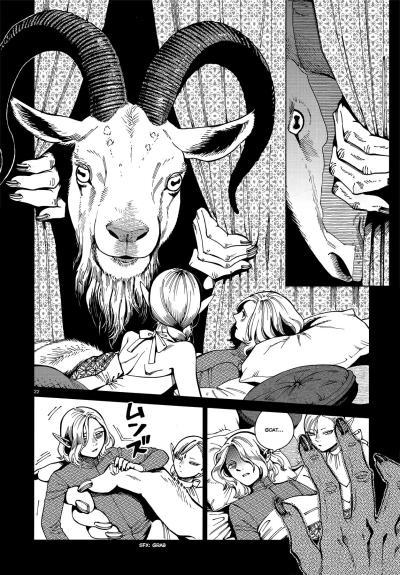
So to start off with, the demon invades Mithrun's bed, specifically. There's even a canopy around it, which specifically evokes this idea of personal intrusion; the barrier is being pulled apart without consent or warning. The way the hand reaches towards Mithrun's body from outside of the panel division makes it almost look like the goat stroking over his body. It's an especially creepy visual detail; similarly, the goat's right hand parts into the side of the panel as well. It's literally like it's tearing the page apart; but gently. So gently.
Mithrun is in bed. It is his bed that the demon is intruding on. He's in a position of intimacy. The woman behind him is a facsimile of his "beloved" that he left behind; the woman who, in reality, chose Mithrun's brother. He is in bed with his fantasy lover, who is leaning over him. While this scene isn't explicitly sexual, it is intimate. And it is being invaded. The goat lifts Mithrun gently, who is confused, but not yet struggling.
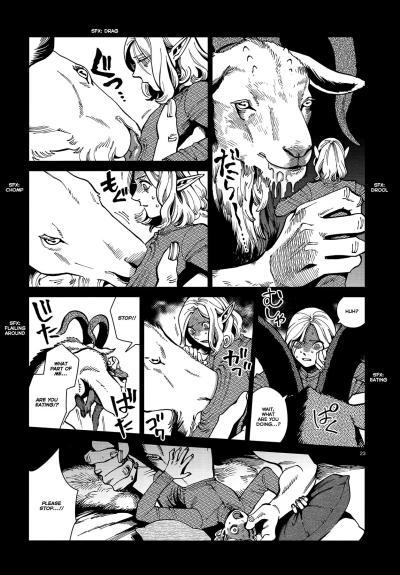
The erotics of consumption and violence in Ryoko Kui's work(remember that the word 'erotic' can have many different meanings, please) are a... notable part of some of her illustrations. I would say she blurs the lines between all forms of desire: personal, sexual, gustatory and carnal, in her illustrations in order to emphasize the pure desire she wants to work with and evoke to serve her themes. Kui deploys sexual imagery in a lot of places in Dungeon Meshi, and this is one of them.
In this case, horrifically. The goat's assault begins with drooling, licking, and nuzzling. The goat could be enjoying and "playing with" its food. But it can also be interpreted as it "preparing" Mithrun with its tongue as it begins to literally breach Mithrun's body. The goat also invades directly through his clothing; that adds another level of disturbing to me. There's nothing Mithrun can do in this moment of violation. Mithrun is fighting, but he is fighting weakly, trying to grip on and push away when he has no ability or option to. All he can do is beg the goat to stop. And it doesn't care. This all evokes sexual assault.
The sixth panel demonstrates a somewhat sexual position, with Mithrun's thighs spread around the goat's hunched over body. In the next, the goat pulls and holds apart Mithrun's thighs as he nuzzles into him. The way the clothing bunches up looks a bit as if it has been pushed up. It has pinned Mithrun down onto the bed, into Mithrun's soft furs and pillows. It takes a place made to be supernaturally warm and comfortable, and violates it. It's utterly and intimately horrifying. To me, this sequence of positions directly evokes a rape scene. I think Kui did this very explicitly. These references to sexual invasion are part of what makes this scene so disturbing; albeit, to many viewers, subconsciously.
This is also the moment the goat takes Mithrun's eye. Other than this, the goat seems exceptionally strong, but also... gentle. It holds Mithrun's body tightly, but moves it around slowly. It doesn't need to hurt Mithrun physically. But in that moment, it takes Mithrun's eye. Blood seeps from a wound while an orifice that should not be pierced is penetrated. This moment, the ooze of blood in one place specifically, also evokes rape. That single bit of physical gore is a very powerful bit of imagery to me.
Finally; it is Mithrun's desire that is eaten. After his assault, Mithrun can find no pleasure in things that he once did. He is fully disassociated from his emotions. This is a common response to trauma, especially in the case of SA. It's not uncommon for people to never, or take a long time to, enjoy sex in the same way again; or at all. They might feel like their rapist has robbed them of a desire and pleasure they once had. I think this makes Mithrun's lack of desire a partial analogue for the trauma of sexual assault.
Mithrun's desire for revenge was, supposedly, all that remained. Anger at his assaulter, anger at every being that was like it; though, perhaps not anger. Devotion, in a way. To his cause. I don't know. But the immediate desire to seek revenge is another response to SA. But on to Mithrun's true feelings on the matter.

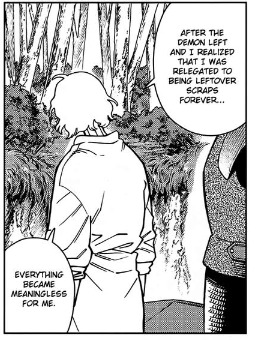
This is... So incredibly tragic. Mithrun feels used up. Like his best parts have been taken away. Like he's being... tossed aside. This certainly parallels the way assault victims can feel after being left by an abuser. Or the way assault victims feel they might be "ruined" forever for other partners. These are common sentiments for survivors to carry, and need to overcome. In the text, it's almost like Mithrun feels the only being who can desire him is a demon who might "finish devouring" him. That that's his only use. It's worth noting that Mithrun trusted the demon. Mithrun's world was built by the demon, and Mithrun, in that way, was cared for by the demon. I think this reinforces Mithrun's place as a victim.
There's also something to be said about Mithrun as a victim of his own possessive romantic and sexual desire. The mirror shows him his beloved just dining with his brother, and it infuriates him. He doesn't know if the vision is real, nor if she has really chosen his brother as a romantic partner. The goat then creates a whole fantasy world where she loves him. As Mithrun's dungeon deteriorates, she is the only person that continues to exist. Mithrun continues to have control over her. And that is the strongest desire the demon is eating, isn't it? There's something interesting there, but I don't know what to say about it.
In conclusion, I think Mithrun's story is an explicit analogue for sexual assault-- though, certainly, among other things! The way the scene plays out and is composed explicitly references sexual violation and invasion of the body. His condition mirrors common trauma responses to sexual violence. And, at the end, he finally realizes he can recover.

Let's end on a happy Mithrun, after taking the first step on his journey to recovery :) You aren't vegetable scraps Mithrun. But even if you were-- every single thing in this world has value. Even vegetable scraps.
#Mithrun#mithrun dungeon meshi#dungeon meshi#ren rambles#dungeon meshi meta#tag later#I refuse to post at prime time look at my dunmeshi meta boy#tw sa#sa tw#this is literally 1200 words slash 6 pages if I added citations and a proper essay format as well as an introduction to Mithrun's character#and general introduction of the text itself#this could literally be an academic paper#lmao#ren meta#rb this plsss i want ppl to read my essay
2K notes
·
View notes
Text
Falmer appearance and attire headcanons
(click on drawings for more details and notes!)
Hair
In Skyrim, we pretty much only see two hair styles to go off of: completely bald and the hair the "shaman" have (which are also the only females we see (a post for another day)).
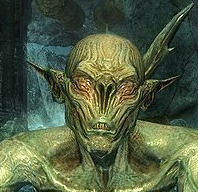
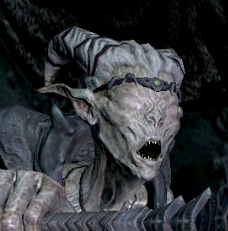
In concept art, particularly Adam Adamowicz's, we see more potential hairstyles. He draws it as wispy and messy, as well as containing braids and the ties we see in the shaman in the game. This art is largely what defines my own interpretation of their hair.
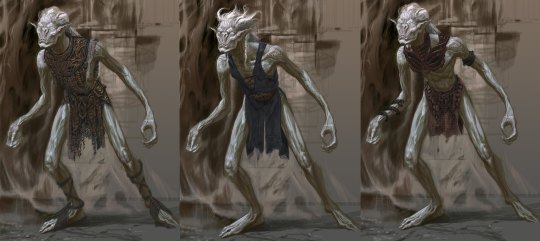

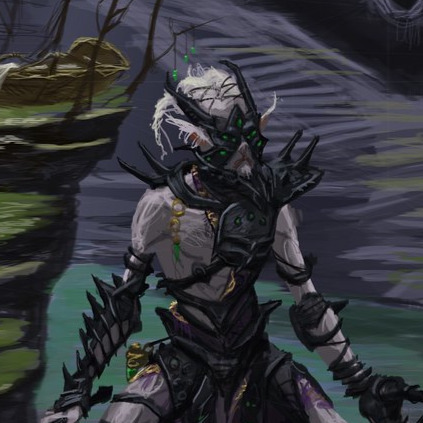
I picture the typical Falmer hair as wavy, thin, wispy, and looking frizzy. Given the high number of hairless Falmer we see, I imagine baldness is common, particularly among males, and sometimes among females. Their hair can be commonly styled into braids or knots to keep it under control.
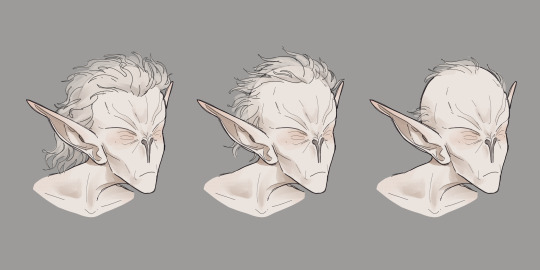
The ability to grow long, thick hair is less common, but those who can tend to style it in other unique ways. Especially among females, long hair is commonly styled into large dense locs (akin to a Polish plait) and held into shapes using ropes or leather ties.
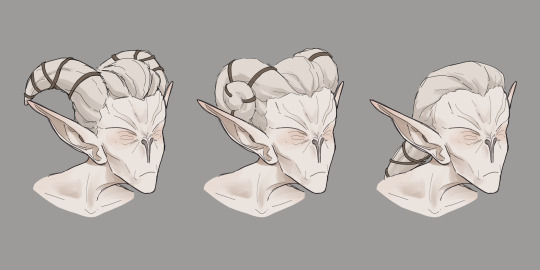
(While I think the intention with the way their hair is drawn and modelled in the game models and concept art was that it was braided and held up with those ties, before looking at it closely I always sorta interpreted it as too stiff to just be braided. As a result, I developed the locs headcanon and have become kinda attached to it even though I have 0 in game or lore support for it)
Materials
The material used in their clothing is obviously dependent on what is accessible to them, and given their unique situation that makes the materials they use and value unique as well. In Skyrim, we see that almost all of their armor (which is mostly what we see them wearing) and homes are made of chaurus chitin (and potentially shellbug chitin), so this is likely the most common resource available to them for non-combative coverings as well. Other materials from their arthropods companions could include their cocoons, unhatched eggs, etc.
Bones from other creatures (draugr, skeevers, trolls, adventurers, bandits, etc.) underground or from aboveground raids could also be used fairly often. These could also provide a source of leather or fur, albeit not a lot of it.
Falmer groups and subcultures inside or in close proximity to Dwemer ruins probably make regular use of the materials present in those ruins as well. With all the metal and machinery present in Dwemer ruins, metal probably makes regular appearances in their clothing (and general decorations) even if they can't manipulate it themselves. Falmer more separated from Dwemer ruins would make much lesser use of these materials, however. Additionally, We see implications of Falmer preparing, cooking, and potentially cultivating fungus in-game, but see nothing indicating they have any plants in their diet, and therefore it is unlikely they regularly make or use textiles or fabrics in their clothing, and if they do they likely come form Dwemer ruins or raided adventurers/bandits/settlements from the surface.
On that note, we know that there have supposedly been incidents of Falmer coming to the surface to attack its inhabitants and travelers, as well as instances of them killing bandits, adventurers, and researchers who venture below, so it's not far fetched to believe that they have access to some materials from the surface. This could give them some access to furs from surface animals, beads, glass, jewelry, textiles, metal objects, etc. they might not otherwise have access to. The rarity of these material among the Falmer would depend on the amount of access any given group of Falmer have to the surface, but among many of them these materials could be seen as more valuable for their rarity and the difficulty to gain them.
While gemstones and ore might be accessible from both natural deposits and underground ruins, unless they had some kind of auditory function or unique texture, they might not have much value to Falmer.
General Attire/Accessories
I like to imagine that the Snow Elves, and by extension the Falmer, have an innate cold resistance in the same way Nords do, and therefore don't require clothes for the purpose of warmth even in the chilly caves of Skyrim. Additionally, their blindness likely means that wouldn't dress for visual aesthetic either. My thoughts are that they are then left with the sense of sound and touch to communicate with each other, and their clothing and accessories could reflect that.
Falmer clothing, decoration, and society in general is very heavily based on touch and texture and little on appearances. They touch each other very often for both communication, movement, and just general day-to-day interactions, and their clothes isn’t very modest, but the tactile patterns and materials used can communicate certain things such as position in society, “wealth”/power, whether they are taken, single, pregnant, with a child, etc., their roles, their age, notable achievements/skills, who is who, etc. on both their clothes and buildings. The more noise one makes, the more attention they draw and the more they drown out other noises, and the more noise making things they can “afford” to have, so the amount of noise one makes in a Falmer settlement is a status symbol. Certain types of noises or noise makers are more coveted than others (chitin beads are common, while furs are less common, and materials only gained from raiding the surface are rare and coveted).
Some noise making accessories could include:
Dangling metal, bones, beads, chitin, etc. that hangs off of their clothing or ears and jingle/clank against each other (in my drawing I show them as pretty uniform in shape and size, but they would probably be much more irregular than I depicted them)
Bells (metal or other materials) that are affixed to or dangle off of their clothing or as earrings.
Hollow bracelets, anklets, necklaces, or other accessories that are filled with rocks or beads.
Rattles tied to the body (made of chitin, dried hollow chaurus eggs, dried chaurus cocoons, beads, etc.) with leather or rope.
Flute or whistle like tubes made of metal, chitin, or dried and treated tube-like fungus that makes a woodwind-esque noise when air passes through it in a certain way. They have been designed to make noise easily from even the slightest movements.
Dried grasses (more temporary) tied to the body that make a swishy noise. More permanently, a similar thing can be achieved with hair. The hair can be sourced from Falmer (either through just cutting hair or through taking it from fallen enemies) or killed humans/mer/draugr. That sort of thing can also act as a kind of trophy.
Necklaces with various materials dangling close together that jingle against each other.
Various materials can be tied into braids or the leather ties in their hair as well.
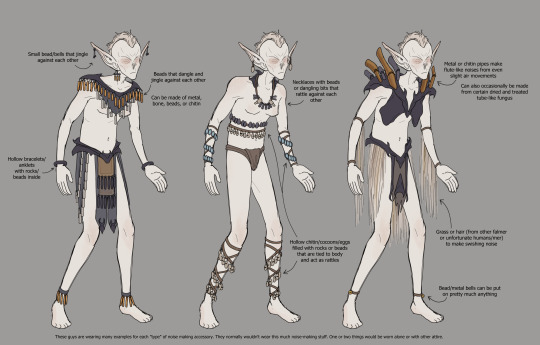
Some textural accessories could include:
Beads. Since they wouldn't have the ability to tell the color of the beads, the patterning of beadwork would be based on the roughness, material, size, or shape of the beads. (I'm sorry I suck as drawing beads)
Furs. This wouldn't be as common since the Falmer likely don't have too much interaction with furry mammals, but some they may have access to that are big enough to make clothing/accessories out of include skeevers or trolls (and potentially rarely animals from the surface). A potential meaning of wearing furs could be as hunting trophies, but it could have other meanings as well.
Chaurus chitin would like be the most common material in Falmer attire, and depending on the part of the chaurus body, the size of the chaurus, or the life stage of the chaurus it was sourced from it could have different textures. Some chitin parts could include large spikes and deep groves, while other parts could be smoother and less rough. The use of this chitin in clothing could take advantage of this contrast in textures. Additionally, chitin or shells from shell bugs might be a different texture from the chaurus chitin. (it's unclear to me whether shell bugs are exclusive to the caves around the Forgotten Vale or if we should consider them distributed throughout Skyrim's underground)
The placement of textured components on the body could have their own meaning to it alongside what accessories or textures are being used.
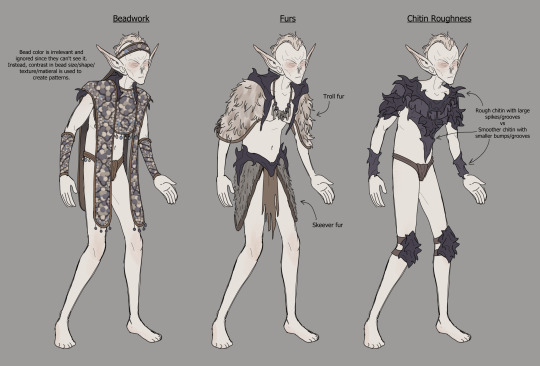
Specific Falmer Subcultures
While most Falmer settlements we see in Skyrim are just a small-ish collection of huts and chaurus corrals, there are two distinctive settlements that are larger, seemingly more organized, and I like to think have their own distinct subcultures worth mentioning: Blackreach and the Forgotten Vale. The unique scope and environment of these Falmer cities (as I like to think of them) could lend to unique clothing cultures as well.
The Falmer of Blackreach have access to a vast Dwemer settlement and have has the space to spread out throughout it more fully since it seems to be more in tact than other Dwemer ruins we see. These guys would likely have a clothing culture much more heavily based on what the can access from these Dwemer ruins (metal scraps, leftover fabrics, etc.)
The Falmer of the Forgotten Vale would also have access to unique resources, such as Vale deer, Vale sabre cats, and frost giants for fur and leather. Additionally, materials accessed from the Chantry of Auri-El such as textiles from clothing, bedding, tapestries, etc. could give them a greater access to fabrics than other Falmer groups. We don't see many close Dwemer settlements to the Vale, so they would have less Dwemeri influence in their clothing than other Falmer groups.
I like to think that the Falmer's evolution exclusively underground has made them poorly equipped to handle the outdoors during the day and has made them particularly susceptible to sunburn, necessitating the need for covering for those in the Forgotten Vale who have significant settlements outdoors. With greater access to textiles and leather, they could use them as coverings when outdoors.
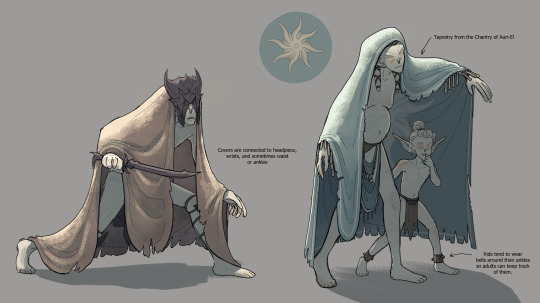
Armor
I actually have very few notes on armor, for two reasons. 1) I hate designing and drawing armor. It is the bane of my existence. 2) I really like the armor they have in game! I think they look awesome aesthetically, and I like how clearly they are made from chaurus chitin. Per usual, Adam Adamowicz's designs seem to have been the major inspiration for the Falmer armor, and he did a great jobs (even if it isn't the most functional looking armor ever).
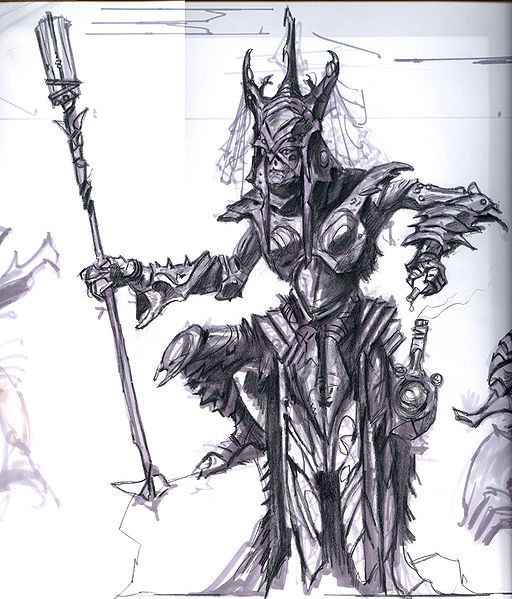
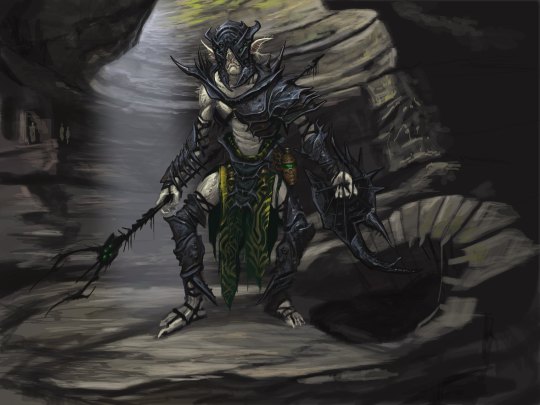
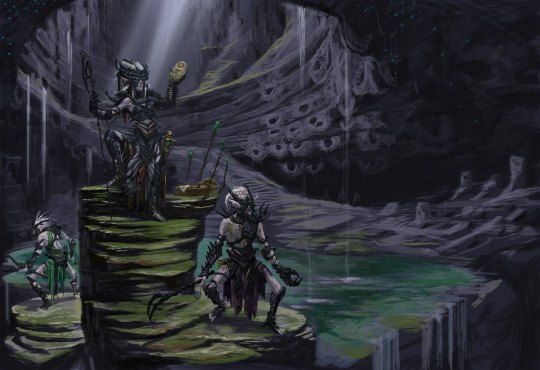
(off topic but I also just want to add that he draws them with little hairs and tufts on their ears and I love it. ok that is all)
I do have a few thoughts about armor though.
Even attire made of textiles make noise when someone moves in them, and I can imagine moving around in armor, especially armor made of hard, insect shells would make a lot of noise when someone moves around in it. When you're relying on sound to navigate your environment and pinpoint potential threats or targets, wearing something making a lot of noise would not be ideal. On the other hand, getting into a fight unarmored would be a problem.
So here's my solution: heavy armor (see below) would only be worm within the camps/settlements where noise was already high and space is more cramped (and therefore more risky in a fight) as a sort of guard in case they were attacked. Those guarding the settlements along the outside might still wear armor as well, but less of it. Those going out to scout or hunt (if they do hunt) would wear as little armor as possible, and try to wear it strategically so that it wouldn't rub against itself and make noise. This is why most Falmer we encounter in the game are wearing little except for loin cloths and kneepads.
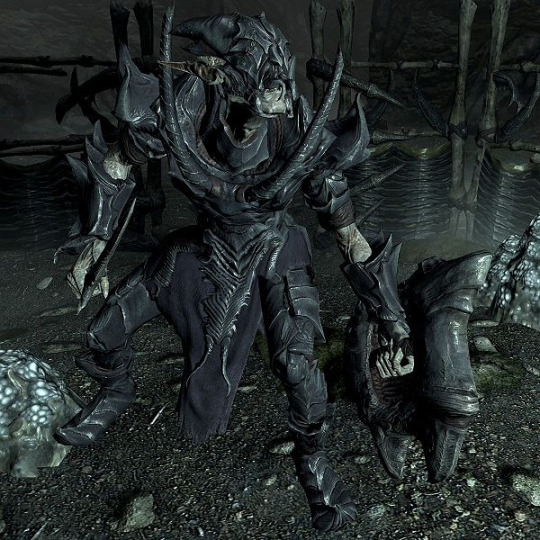
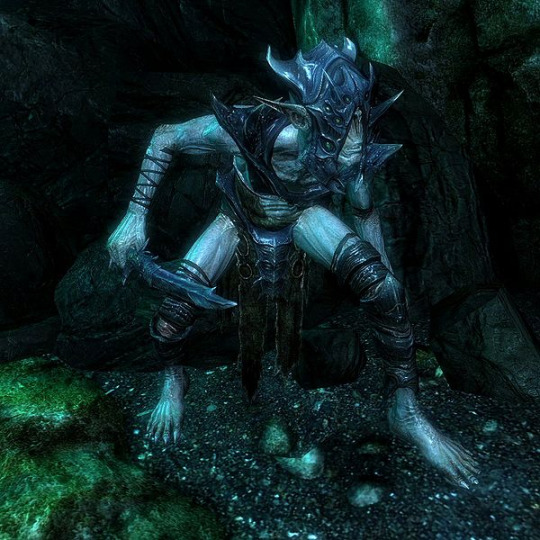
One more idea I have for armor is a specific armor piece. On the note of guarding or protecting a camp or settlement, I imagine the noises of it all (especially with the noise based headcanons I've laid out here) would make it hard to actually catch any potential threats when you can't see. A large slightly concave piece of armor worn behind the head could block out noises from behind the wearer, as well as a help focus sounds ahead of them.
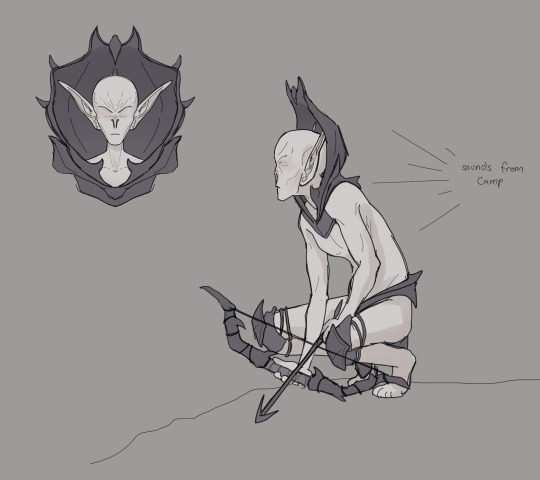
That is all! Thank you for reading! A lot of these concepts around the culture of sound I think could also be applied to their buildings and even a culture of music, but those are posts for another time.
All of the concept art I used was taken from here and all of the Skyrim screenshots are from UESP.
#skyrim#tes#the elder scrolls#falmer#skyrim headcanon#tes headcanons#headcanon#sorry this is long (but not really)#i just cant express my thoughts like a normal person. college conditioned me to format everything like an essay where i have to provide#sources and shit lol#also im kinda autistic about falmer#i appreciate those of you who read it all!#mine#adam's concept art makes me feel very validated in my echolocation headcanon because its very obvious he references bats in their face#which is another post idea i have for another day#my art
1K notes
·
View notes
Text




ah yes. me, my boyfriend, and his personification of hope that looks like me 🌸☀️😶
#pspsps read my friend’s stranger analysis essay#the 3rd wheel of all time…….#my stranger plushie has an emo bang swoopy over his eye i’m 🖤#off topic post#omori#sunny omori#omori sunny#basil omori#omori basil#stranger omori#omori stranger#sunflower omori#omori sunflower#omori sunshadow
373 notes
·
View notes
Text
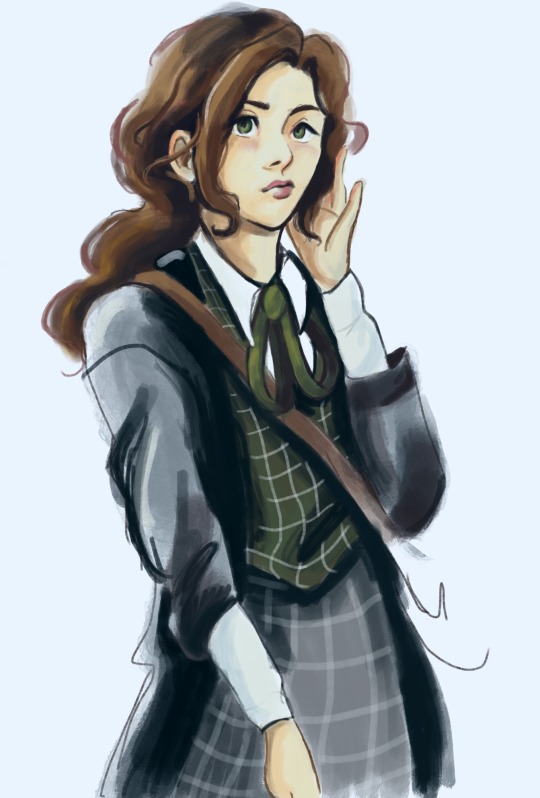
my first attempt at digital art (never again🥲) for mctober💘
Eloise Babbit✨
slytherin
5th year
favorite subjects: arithmancy & ancient runes
least favorite subject: beasts (animals make her nervous🥲)
hobbies: reading & thinking (IT’S A HOBBY OKAY??)
#if u read my fic maybe u know why animals make her nervous🥲#also…if you are the angel who left me an essay comment on my last chapter today just know I love you🥹🥹🥹🥹🥹#when I started posting my fic in January I NEVER EXPECTED PEOPLE TO READ IT !!!!!!!!!!!!!😳 but it makes me so happy#that so many people do🥹🫶 I know it’s a crazy story and doesn’t follow the game at all#so to hear these things and to catch all of the little foreshadowing things I’ve been hinting at this whole time?????????#😳💘#anyways I’m still a digital art disliker (I like seeing it but not making it)#but I wanted to try it out and this is my art documentation blog🫶#im going to be WAY less active these days as well#SO IF I MISS THINGS (WHICH I WILL) PLEASE KNOW I AM SAD I MISSED THEM😔😔😔😔#hogwarts legacy#hogwarts legacy fanart#hphl#hogwarts legacy mc#hogwarts legacy oc#eloise babbit#mctober2024#also with mctober I will post drawinfs but nothing elaborate like the amazing ones I’ve already seen#hope you like these anyways🙏💓
215 notes
·
View notes
Text


Day 173
#genshin impact#kaveh#genshin kaveh#alhaitham#genshin alhaitham#kavetham#day 173#i dont get how alhaitham reads with his hair covering one eye#also may not post for a week or two- school is killing me btwn exams and essays but dw ill be back
375 notes
·
View notes
Text
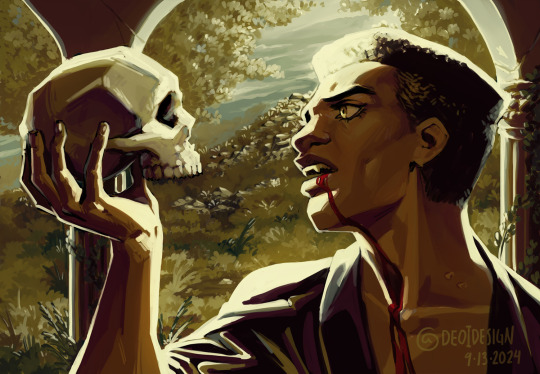
Thinking about vampires, death, life, and the space they occupy in between
#to be or not to be. that is the question#ty adam for being my model for dramatic vampire moment#musings on the thinkings about:#when to live you are required to hurt others. you must repeatedly ask yourself what the value of your life is#To sleep... perchance to dream...#ah. THERES THE RUB.#ok I actually couldnt come up with too many thoughts. I had a lot more while I was drawing this but I guess I put them in the painting LOL#reading that soliloquy and being like damn this is just like vampires#the reality of course is that the soliloquy is a debate over suicide and ultimately making the choice to live#even if just out of fear of the unknown#and vampires are about dying and then in undeath choosing to continue to live#despite the fear of eternity and loneliness and hurting others#theyre not the same. but like let me thiiink come onnnn I'm allowed to thiiink and have incomplete thoughts#I would have to write like a proper essay about this to organize my thoughts. this is the tags on a tumblr post.#anyways finished episode 79#working on patreon stickers for this month (and next month soon)#and working on book 4. taking a pause from episodes cause I've got 3 weeks of buffer now... UGH#I'm so mad that they changed it. it would have been 5 weeks before but it's fine it's whatever#anyways yeah taking a break from episodes to make my book now!#its good stuff.#and this painting is good stuff#banger after banger from me tbh#this was a little relaxing giving myself a couple hours to muse#it's necessary for my health and I always forget that til I do a painting...#I loved doing the little landscape in the background too I should do that more! I love how plants are just like whatever shape you want#like you can make up any plant you want and not only does that plant PROBABLY exist somewhere#a weirder plant exists somewhere too. so. literally whatever you want#ok bye again for a few days while I get back to work
283 notes
·
View notes
Text
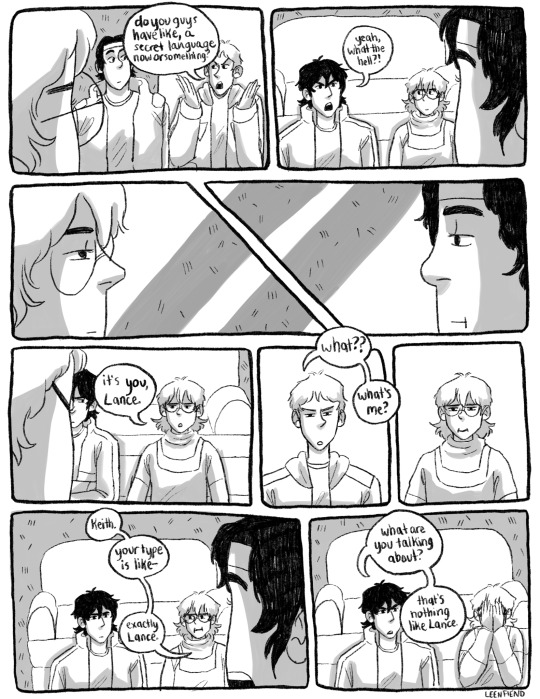
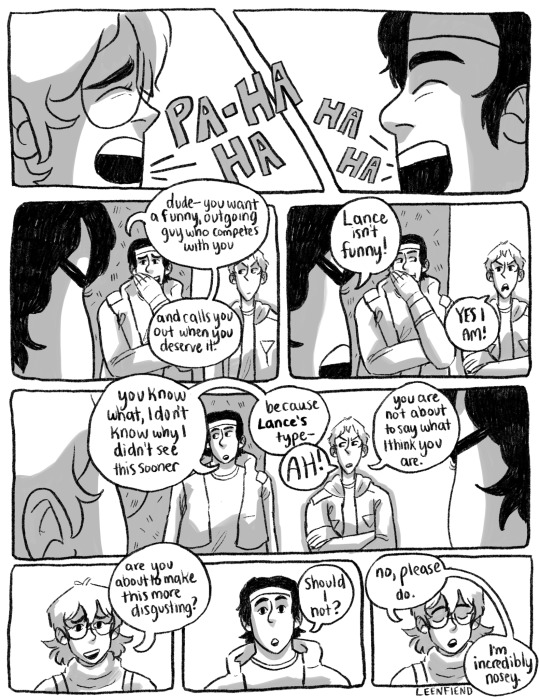
what's ur type first < prev next >
#YAHOOO#i finally finished editing this first scene in the fic lmfao ... so updates will probably be faster in the coming days#also still unsure as to whether I'll draw... the whole fic#it's like 10k words+ so#im still on like page 4 rn I think. out of like. 20.#let me know what u think tho do u guys want this all drawn out cause .. .. it'll take a lil while also i'll definitely still post the fic#ive put too many hours into that bad boy at this point to let it collect dust#and i think u get something different out of reading that than the comic anyway tbh#which is fun !!#ok enough tag essaying thank u all for reading if u did : )#wut#what's ur type#klance#vld#voltron#my art
1K notes
·
View notes
Note
Matching pyjamas mayhaps?:3

#bsd#bungo stray dogs#bungou stray dogs#bsd dazai#bsd chuuya#bungo stray dogs dazai#soukoku#skk#my art#bsd art#Ngl this looks like loungewear I think lmao im sorry#I legit looked up pajamas and then i was like…hmm#on my first attempt it did look more like pyjamas I promise#the height difference is not accurate SHHH im sorry by the time I ‘realized’ I got too lazy—-#every time I post I hope things dont look over saturated I fr dont know#I stare on different devices sometimes to check but#this i what I get for posting late instead of sleeping#what sleep#I am going to be so tired tomorrow *rambles in tags*#I read my tags later on and wonder why did I write an essay
172 notes
·
View notes